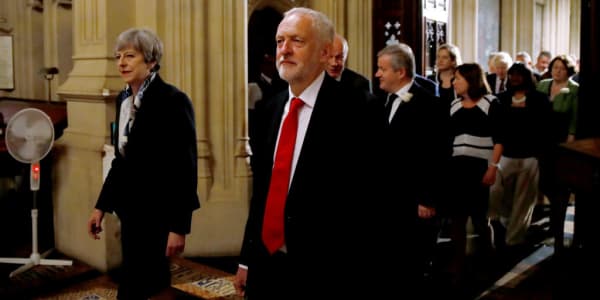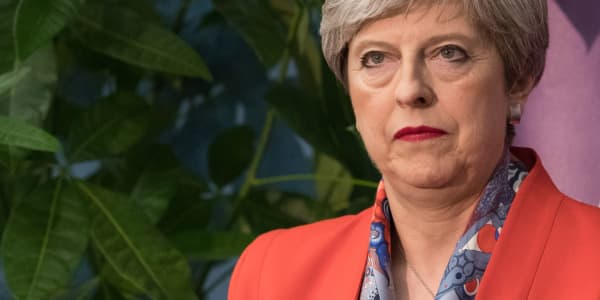British Prime Minister Theresa May is drawing ever-closer to striking a deal with Northern Ireland's Democratic Unionist Party (DUP) which will enable her to form a parliamentary majority and remain at the helm of the government.
Senior Conservative sources confirmed on last week that ongoing talks between the two parties were "very positive and constructive", and with the Queen set to open parliament on June 21 a deal looks as though it is drawing ever closer.
Such a partnership is not unheard of in British politics. Indeed, in 2010 the Conservative party formed a coalition government with the Liberal Democrats to form a ruling majority. However, the proposed deal with the 10-seat regional party, fifth-largest in the U.K., has provoked particular consternation, with critics suggesting that it could undermine British democracy and threaten disrupting the hard-fought Northern Ireland peace process.
So, just why is it so controversial?
Who are the DUP?
This was the question many asked when the Conservative party indicated on the morning of the election result that it would seek to strike a deal with the DUP to prop up the government after losing a number of parliamentary seats in June 6's snap general election.
Representing centre-right to right-wing values, the protestant party is the largest in Northern Ireland by number of seats but only represents constituencies within Northern Ireland.
How will a DUP deal impact the U.K.?
If May's Conservatives succeed in striking a 'confidence and supply deal', which will grant them backing in key parliamentary votes, they will have to agree to certain DUP demands.
The DUP hasn't yet clarified what these demands will be. But, whether linked to public spending, agriculture or infrastructure, they will likely involve increased spending, which would give Northern Ireland a distinct advantage over the rest of the U.K.
Why is this concerning for Northern Irish politics?
Though Northern Ireland could be set to benefit financially from close ties to Westminster, critics argue that these ties could threaten to undermine hard-fought political cohesion in the country.
Under the 1998 Good Friday Agreement, the British government is supposed to be an impartial broker on any disagreements within Northern Ireland's devolved – and currently suspended – parliament, the Northern Ireland Assembly.
The Good Friday Agreement explained
The Good Friday Agreement is generally considered the major turning point in establishing peace within Northern Ireland.
It refers to two agreements, both signed on Good Friday 1998, which helped form Northern Ireland's current devolved system of government at Stormont, Belfast. This allows for power-sharing between Northern Ireland's two largest parties and largely brought about the end of Northern Ireland's 30-year Troubles.
What were the Troubles?
The Troubles refer to three decades of sectarian conflict within Northern Ireland, which took place between the late-1960s and the late 1990s.
The conflict was largely political and nationalistic, centring on the constitutional status of Ireland. Unionists, who were predominantly protestant, fought to remain part of the U.K., while Republicans, largely Catholics, wanted to join a united Ireland.
Thirty years of fighting ensued between Unionist and Republican paramilitaries, state security and political activists. The conflict largely occurred within Northern Ireland, though spread to the Republic of Ireland, the U.K. and parts of Europe, and claimed the lives of thousands of civilians.
Why is the North Ireland Assembly suspended?
Power-sharing in the Northern Irish Assembly has been suspended since January amid a political stalemate between the member parties. These include unionists the DUP; nationalists Sinn Fein; the Social Democratic and Labour Party; the Ulster Unionist Party; and the Alliance party.
The party have until June 29 to agree to return to power-sharing. Under the Good Friday Agreement, the British government has a duty to facilitate these talks and help parties return to power sharing. If the parties cannot agree, they will be forced to return to direct rule under the U.K. government.
What are politicians doing?
May met with the leaders of Northern Ireland's main political parties on Thursday to discuss restoring devolution at Stormont.
However, critics have argued that the proposed deal will compromise the government's ability to remain impartial in these talks.
Former Conservative Prime Minister John Major, who was instrumental in initiating the peace talks, said on Tuesday that the U.K. could no longer be an "honest broker" if it struck a deal with the DUP.
Sinn Fein Stormont leader Michelle O'Neill came out on Thursday to say that she would be holding talks with May to guarantee the party's position in Northern Irish politics.
"I will be making it very clear that any deal between the Tories and the DUP cannot be allowed to undermine the Good Friday and subsequent agreements," O'Neill said in a statement.





